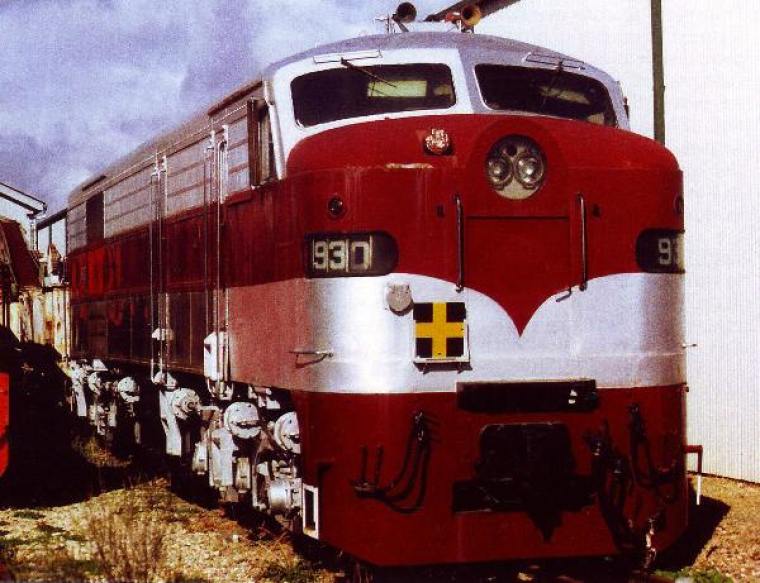

As a former locomotive engineman and now the Footplate Padre with 37 years of Christian ministry behind me, just as there are distinctive sermon types, and distinctive ministry styles, and distinctive WWII aeroplanes, there are equally distinctive locomotive sounds.
The Goodwin Alco diesels on the NSW Government Railways of the '50s to '80s had a very different sound to the GM locomotives and they in turn had a very different sound the Caterpillar block engines and English Electrics.
The Goodwin-Alco main stay larger locomotives were the 44 Class, the 45 Class, the 48 Class and later the 80 Class. Their idle sound was an oscillating one that had the effect that one was sure the engine itself was shutting down. Up would go the growl of the engine, then down again, and so forth.
When running hard, the Goodwin-Alco sound was a heavy low growling experience and in the cabin of the classic streamlined 44 Class, it was a strong throb of the engine block when powering up. The 45 Class as a hood engine design with a full height nose at the front or engine leading in the other direction, the sound was not dissimilar to what observers would hear.
The air-conditioned and sound proofing of the 80 Class square ended diesel cabin design was very different again, as much of the sound was dissipated to the crew driving the locomotive.

The GM locomotives had a higher pitch sound to them and their idle speed was higher and one always had the feeling they were idling too high.
The early 42 Class streamlined cabin designed diesels did not have sound proofing and they were heavy going on the ears. These GM had whine to their sound and one could always tell when a GM was on the front in the still of the night air.
The 421 Class streamlined cabin was sound proofed but it too was noisy but the newer 422 Class square ended GMs were sound proofed with that whine largely gone. The 49 Class was of hood design and it was not that dissimilar to the 421 Class.
Many of the Queensland diesels were English Electrics and their sound was very distinctive and had a sound that illustrated powering up and cutting off as clear as night from day. I can recall as a child hearing the Queensland diesels climbing various ranges and one could clearly identify at night time in the wee small hours when driver had reached the summit and as the train came over the hill, and began to cut off the power.

Qld Diesels a different sound
As a young man working as a locomotive engineman during my annual leave I would inevitably visit my Uncle Wally and Auntie Illma at Geebung in Brisbane and one of my joys, as strange as this might seem, was to visit the nearby railway station and watch as the blue and white Queensland diesels came in and marvel at their different sounds to our NSW Government Railway diesels.
I was able to identify the Class of Queensland diesel by their sound and when powering up their distinctive sound was even more clarifying. In my view the blue and white livery of the Queensland diesels were a feature of that State as the Sunshine State. I along with many railway enthusiasts were so disappointed when that livery was replaced.
The Goodwin-Alco diesels were by far the most distinctive sounding diesels and left a lasting impression when standing at Central Railway Station in Sydney. Many a traveller on one of the great trains of the sixties and seventies, the Southern Aurora, The Spirit of Progress or the Brisbane Limited, would delight themselves by walking to the front of the train and observing the locomotives.
This would happen on many other trains as well. I can still recount the many occasions this occurred to me when at Central taking passenger trains to Wollongong and these were usually 48 Class diesels (Goodwin-Alcos), occasionally a 44 Class. Passengers would walk up and have a chat, occasionally they sought to take a look inside the cabin.
A steam story
One of the steam engine stories recounted was the passenger who wanted to alight at Lilli Pilli a very small railway station down from Waterfall. This was a drop-off platform, the train would only stop when a passenger sought to be dropped off. On this occasion the fellow came to the engine and advised the driver he wanted to be dropped off at Lilli Pilli.
To save time and the energy needed by the steam engine to get going again, as he was the only one to be let off, the driver advised him to come up to the engine at Waterfall, then as they reached Lilli Pilli the driver would slow right down, the big burly fireman would hold him out the side, he's get his legs rotating and at such a slow speed, the fireman would drop him onto the platform. This sounded like a good plan to the passenger and thus it happened.
The driver slowed right down at Liili Pilli platform, the big burly fireman held out the passenger whose legs were rotating and dropped he was. The driver immediately powered up and the train surged forward. At this moment the guard looked out and saw this chap running flat out on the platform and as the guard's van sped past him, he leaned out and grabbed him and hauled him into the van with the guard expressing: "You nearly missed the train, good thing I saw you!"
The Footplate Padre says that the Lord is like that guard who sees a desperate man and without realising it is the target of his eternal love.

Dr Mark Tronson is a Baptist minister (retired) who served as the Australian cricket team chaplain for 17 years (2000 ret) and established Life After Cricket in 2001. He was recognised by the Olympic Ministry Medal in 2009 presented by Carl Lewis Olympian of the Century. He mentors young writers and has written 24 books, and enjoys writing. He is married to Delma, with four adult children and grand-children.
Mark Tronson's archive of articles can be viewed at http://www.pressserviceinternational.org/mark-tronson.html